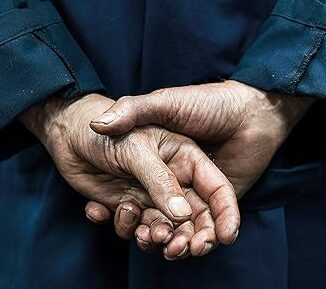By Joshua Penduck
The Dignity of Labour
Jon Cruddas
Polity, £14
This is part of a series of book reviews exploring the reasons for the re-election of Donald Trump in 2024. I began by looking at the rise of National Populism, before exploring the culture wars instigated through ‘woke’ politics, the leftwing establishment’s abandonment of the values of the working class, and the rise of nationalism. Last time I reviewed Adrian Pabst book Postliberalism which explained how a new politics – left on economics and right of social matters – has arisen.
However, one of the central aspects of the MAGA movement is reindustrialisation and the dignity of manual work. To help explore this, we will be reviewing an insightful book by the former MP of Dagenham and Rainham, Jon Cruddas.
Cruddas (like Paul Embery, whose book Despised I previously reviewed for this series) bases his own experiences in Dagenham. He notes how two recent films based in the ward demonstrate how our experience of work and community have changed. The first, Made in Dagenham, looks at how the 1968 Ford strike brought the community together; the second, Fish Tank, looks at the breakdown of communal life in Dagenham. This contrast demonstrates how much community has broken down with deindustrialisation.
Cruddas writes with two opponents in mind: those from the right and Third Way left who laud the globalised economy; and those from the techno-Utopian left who laud technological progress for building a ‘Communist’ future. For example, he notes how the Blair government emphasised developing ‘a new knowledge- based economy’ (69) for the globalised 21st Century, centred around ‘smart’ technologies. As part of that, the old industries were lumped into the dustbin of history: ‘British car plants didn’t fit into this shiny version of “new knowledge” work’ (70).
An example of this would be the gradual (or rather not-so- gradual) depletion of the Ford factory in Dagenham. Yet rather than Britain being equipped for the 21st Century, it has left a stagnant economy – and abandoned communities. Instead of being equipped for the new economy, workers were essentially left to fend for themselves.
However, Cruddas also has his mind on the ‘techno-Utopians’. These believe that with the rise of AI and robotics, a bright new Communist future awaits, especially through implementing Universal Basic Income (UBI). However, Cruddas notes that this overly optimistic appraisal of the future lacks one fundamental insight: human beings need dignified work.
Indeed, he argues that part of the mental health crisis in the West is because of the lack of meaningful work. Work is not merely a utilitarian process towards an end – prosperity – but rather a key component of what it means to be human.
In the second half of the book, he outlines ‘the dignity of labour’. Drawing on Aristotle and Catholic Social Theory, Cruddas argues that dignified work is intimately tied up with justice, community, and the moral imperative to protect the vulnerable. Work should not be a means to an end for market prosperity but rather an end in itself. In this sense he calls for a ‘Good Work Covenant’, which I quote in full:
1. Right – Everyone should have the right to good work.
2. Fair reward – Everyone should be paid fairly.
3. Decent conditions – Everyone should work on decent terms and conditions. 4. Equality – Everyone should be treated equally and without discrimination.
5. Dignity – Work should promote human dignity. 6. Autonomy – Work should promote autonomy.
7. Wellbeing – Work should promote physical and mental wellbeing.
8. Support – Everyone should have access to institutions and people who can represent their interests.
9. Participation – Everyone should be able to take part in determining and improving working conditions.
10. Learning – Everyone should have access to lifelong learning and career guidance.’
Cruddas notes that a new form of dignified industrial labour could happen through the development of new Green industries. Reading through the book I was struck by a similarity to Erich Fromm’s arguments for dignified labour and the necessity for work in his book The Sane Society.
Both Fromm and Cruddas share a humanist instinct for creating a society which works for humans as they are, not as we would want them to be; furthermore, both are inspired by Marx’s economic analysis (which Cruddas, drawing on the Frankfurt School of Marxism – of which Fromm was a member – argues is far more humanistic than the utilitarian approach that became mainstream).
Cruddas’ book reminds us that part of the reason for the rise of the New Right and the collapse of the Left is that human beings – in their communities, natures, and work – have been abandoned by the (supposedly) bright shining future of globalisation and technological advancement. A recovery of the dignity of labour is vital, especially if we wish to avoid a new authoritarianism.












